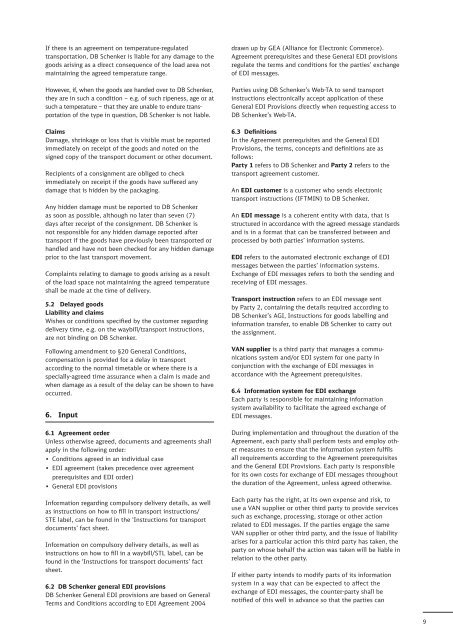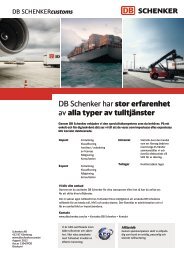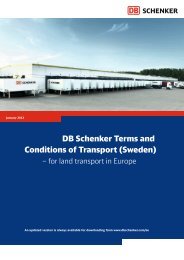DB Schenker Terms and Conditions of Transport
DB Schenker Terms and Conditions of Transport
DB Schenker Terms and Conditions of Transport
- No tags were found...
Create successful ePaper yourself
Turn your PDF publications into a flip-book with our unique Google optimized e-Paper software.
If there is an agreement on temperature-regulatedtransportation, <strong>DB</strong> <strong>Schenker</strong> is liable for any damage to thegoods arising as a direct consequence <strong>of</strong> the load area notmaintaining the agreed temperature range.However, if, when the goods are h<strong>and</strong>ed over to <strong>DB</strong> <strong>Schenker</strong>,they are in such a condition – e.g. <strong>of</strong> such ripeness, age or atsuch a temperature – that they are unable to endure transportation<strong>of</strong> the type in question, <strong>DB</strong> <strong>Schenker</strong> is not liable.ClaimsDamage, shrinkage or loss that is visible must be reportedimmediately on receipt <strong>of</strong> the goods <strong>and</strong> noted on thesigned copy <strong>of</strong> the transport document or other document.Recipients <strong>of</strong> a consignment are obliged to checkimmediately on receipt if the goods have suffered anydamage that is hidden by the packaging.Any hidden damage must be reported to <strong>DB</strong> <strong>Schenker</strong>as soon as possible, although no later than seven (7)days after receipt <strong>of</strong> the consignment. <strong>DB</strong> <strong>Schenker</strong> isnot responsible for any hidden damage reported aftertransport if the goods have previously been transported orh<strong>and</strong>led <strong>and</strong> have not been checked for any hidden damageprior to the last transport movement.Complaints relating to damage to goods arising as a result<strong>of</strong> the load space not maintaining the agreed temperatureshall be made at the time <strong>of</strong> delivery.5.2 Delayed goodsLiability <strong>and</strong> claimsWishes or conditions specified by the customer regardingdelivery time, e.g. on the waybill/transport instructions,are not binding on <strong>DB</strong> <strong>Schenker</strong>.Following amendment to §20 General <strong>Conditions</strong>,compensation is provided for a delay in transportaccording to the normal timetable or where there is aspecially-agreed time assurance when a claim is made <strong>and</strong>when damage as a result <strong>of</strong> the delay can be shown to haveoccurred.6. Input6.1 Agreement orderUnless otherwise agreed, documents <strong>and</strong> agreements shallapply in the following order:• <strong>Conditions</strong> agreed in an individual case• EDI agreement (takes precedence over agreementprerequisites <strong>and</strong> EDI order)• General EDI provisionsInformation regarding compulsory delivery details, as wellas instructions on how to fill in transport instructions/STE label, can be found in the ‘Instructions for transportdocuments’ fact sheet.Information on compulsory delivery details, as well asinstructions on how to fill in a waybill/STL label, can befound in the ‘Instructions for transport documents’ factsheet.6.2 <strong>DB</strong> <strong>Schenker</strong> general EDI provisions<strong>DB</strong> <strong>Schenker</strong> General EDI provisions are based on General<strong>Terms</strong> <strong>and</strong> <strong>Conditions</strong> according to EDI Agreement 2004drawn up by GEA (Alliance for Electronic Commerce).Agreement prerequisites <strong>and</strong> these General EDI provisionsregulate the terms <strong>and</strong> conditions for the parties’ exchange<strong>of</strong> EDI messages.Parties using <strong>DB</strong> <strong>Schenker</strong>’s Web-TA to send transportinstructions electronically accept application <strong>of</strong> theseGeneral EDI Provisions directly when requesting access to<strong>DB</strong> <strong>Schenker</strong>’s Web-TA.6.3 DefinitionsIn the Agreement prerequisites <strong>and</strong> the General EDIProvisions, the terms, concepts <strong>and</strong> definitions are asfollows:Party 1 refers to <strong>DB</strong> <strong>Schenker</strong> <strong>and</strong> Party 2 refers to thetransport agreement customer.An EDI customer is a customer who sends electronictransport instructions (IFTMIN) to <strong>DB</strong> <strong>Schenker</strong>.An EDI message is a coherent entity with data, that isstructured in accordance with the agreed message st<strong>and</strong>ards<strong>and</strong> is in a format that can be transferred between <strong>and</strong>processed by both parties’ information systems.EDI refers to the automated electronic exchange <strong>of</strong> EDImessages between the parties’ information systems.Exchange <strong>of</strong> EDI messages refers to both the sending <strong>and</strong>receiving <strong>of</strong> EDI messages.<strong>Transport</strong> instruction refers to an EDI message sentby Party 2, containing the details required according to<strong>DB</strong> <strong>Schenker</strong>’s AGI, Instructions for goods labelling <strong>and</strong>information transfer, to enable <strong>DB</strong> <strong>Schenker</strong> to carry outthe assignment.VAN supplier is a third party that manages a communicationssystem <strong>and</strong>/or EDI system for one party inconjunction with the exchange <strong>of</strong> EDI messages inaccordance with the Agreement prerequisites.6.4 Information system for EDI exchangeEach party is responsible for maintaining informationsystem availability to facilitate the agreed exchange <strong>of</strong>EDI messages.During implementation <strong>and</strong> throughout the duration <strong>of</strong> theAgreement, each party shall perform tests <strong>and</strong> employ othermeasures to ensure that the information system fulfilsall requirements according to the Agreement prerequisites<strong>and</strong> the General EDI Provisions. Each party is responsiblefor its own costs for exchange <strong>of</strong> EDI messages throughoutthe duration <strong>of</strong> the Agreement, unless agreed otherwise.Each party has the right, at its own expense <strong>and</strong> risk, touse a VAN supplier or other third party to provide servicessuch as exchange, processing, storage or other actionrelated to EDI messages. If the parties engage the sameVAN supplier or other third party, <strong>and</strong> the issue <strong>of</strong> liabilityarises for a particular action this third party has taken, theparty on whose behalf the action was taken will be liable inrelation to the other party.If either party intends to modify parts <strong>of</strong> its informationsystem in a way that can be expected to affect theexchange <strong>of</strong> EDI messages, the counter-party shall benotified <strong>of</strong> this well in advance so that the parties can9
















